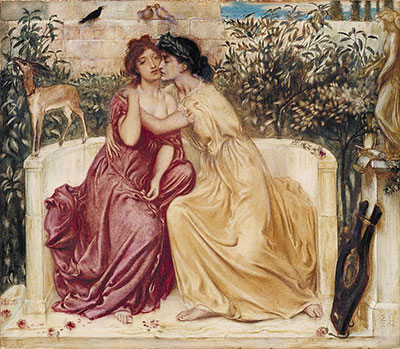SAPPHO was a Greek lyrical poet, who lived around 630 BC – 570 BC and who is predominantly known for her poems which focus on love for women and lesbian love. Her home was on the island of Lesbos, from which the word “lesbian” is derived. Sappho’s

presence and the worth and content of her poetry, then, become obvious when we think that the word used to describe women who love other women was born from the island where she lived. She was so skilled that she was sometimes referred to as the “Tenth Muse.”
Much of Sappho’s poems remained unexamined for a long time, and they currently exist as various fragments that modern scholars have used, and are using, to give Sappho and her poetry the kind of study and recognition they deserve. One of the ways in which Sappho represents what appears to be same-sex love in her poetry, and also imparts some sanctity to such relationships, is by imbuing her poems with elements from her belief system.
The Greek goddess of love and beauty, Aphrodite, for example, is sometimes referenced in her poems in order to elevate the same-sex relations Sappho writes about. In the poem, “I have not had one word from her”, (trans. Mary Barnard), Sappho’s persona seems to be pining away for a female lover who has left her. In sadness, the persona tells the lover: “If you forget me, / think of all of our gifts to Aphrodite / and all the loveliness we shared.”
The “gifts” that are mentioned could refer to offerings and sacrifices to the goddess, but one cannot help thinking that when the goddess of love is involved, surely the greatest gift that can be given is that of love itself; love expressed in some manner would be the essential offering that one is expected to give to Aphrodite, goddess of love. Clearly, Sappho’s persona in the poem is referencing the love between herself and the woman to whom she writes. In bitterness, the persona is asking/forcing her lover to remember their moments together, sexual or otherwise; the moments of love; and their “gifts to Aphrodite”, in an effort to persuade her lover to come back to her.
Another poem by Sappho, simply titled “Fragment 1”, (trans. Gillian Spraggs), is a direct invocation to Aphrodite to come to the aid of the persona and help her win the love of another woman. In this poem, Sappho is able to use the idea of a woman praying (to a goddess) in order to win over another woman, which does bring to mind several heterosexual heroines in literature (oral and written) who often prayed to a god/goddess to save or bring their (heterosexual) lover back to them. Aphrodite in “Fragment 1” says, “Whom shall I seduce back to your love / this time? Who is it, Sappho, / who flouts you?” Sappho presents the goddess as being entirely supportive of the persona’s feelings for another woman, clearly understanding her desires and knowing how to remedy the situation.
Aphrodite replies to the persona’s pleas for help by saying, “…if she’s in flight, soon she’ll pursue; / if presents she will not accept, she shall give; / if she does not love, then love she shall, and soon, / even against her wish.” The fact that Aphrodite is so responsive to this lesbian relationship, going so far as to seemingly imply that she herself will enchant the woman who has spurned the persona’s affections, causing the woman to reciprocate the persona’s love “even against her wish”, says quite a lot about the views ancient Greeks, and Sappho herself, had about religion and its role in relationships.
The interference of the goddess in this affair is Sappho’s way of creating a direct link between Aphrodite and love, specifically lesbian love. She may be implying that the goddess does not discriminate when it comes to love, regardless of if it’s between man and woman or woman and woman. Her presentation of the goddess as a being willing to help a lesbian get the woman she wants is an obvious indicator that Sappho is portraying lesbian relationships as being sanctified by a deity in her belief system, thereby ensuring that lesbian relations are in no way inferior to heterosexual ones.
This use of religion as a mechanism with which to express same-sex desire in poetry is simply one of several techniques used by Sappho to extoll the virtues of lesbian romances in her poems.



.jpg)








